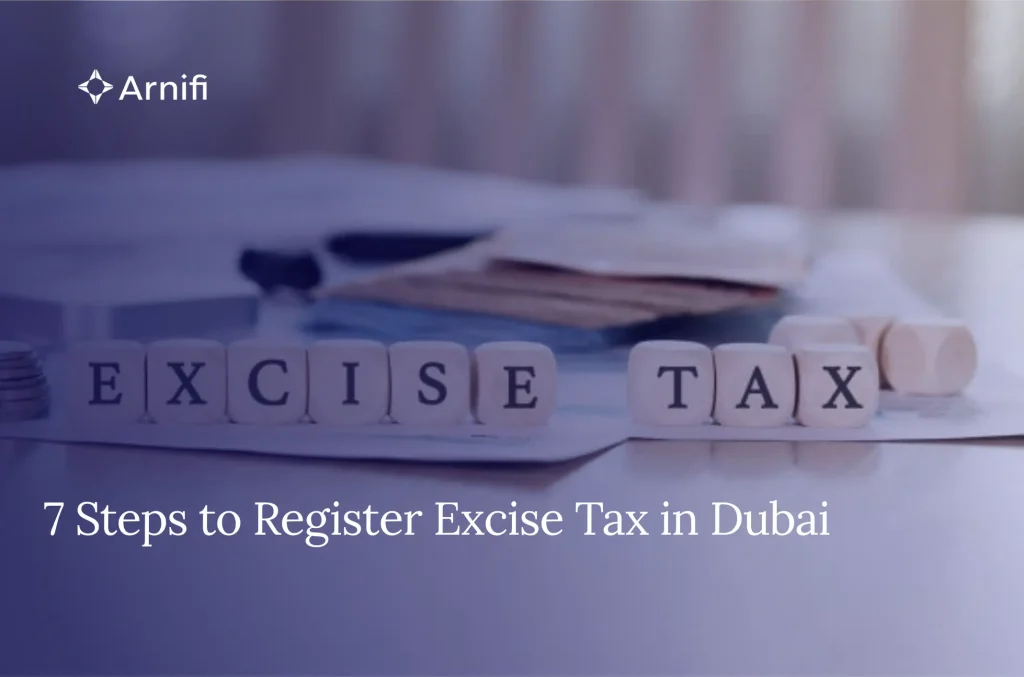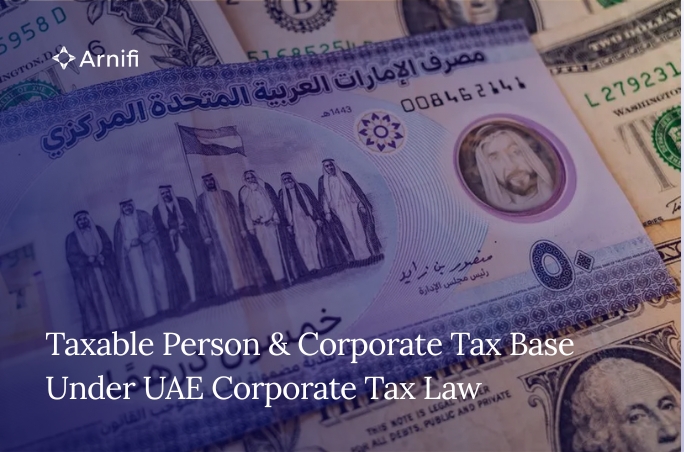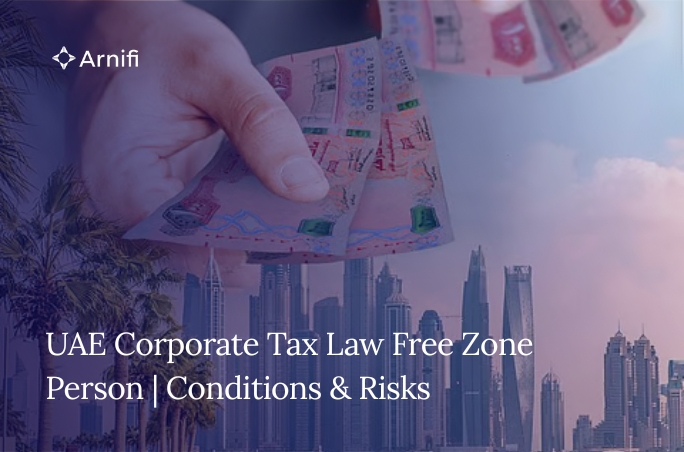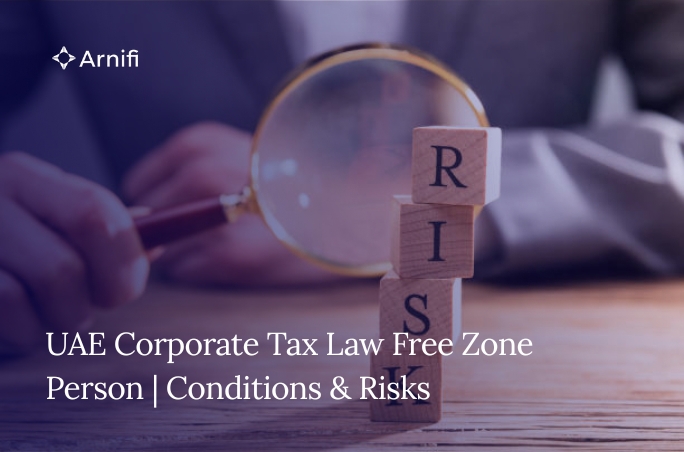7 Steps to Register Excise Tax in Dubai
by Shethana Nov 24, 2025  7 MIN READ
7 MIN READ

Excise tax in the UAE applies to specific goods that harm health or the environment, such as tobacco, energy drinks, and sweetened drinks. It has been in force since 2017 and now uses high rates to change consumption patterns and raise revenue.
Table of contents
- What is Excise Tax in UAE and Who Must Register?
- Key Excise Goods and Rates In UAE
- How to Calculate Excise Tax In UAE
- Documents to Prepare Before Excise Tax Registration
- 7 Steps to Register Excise Tax In Dubai Through EmaraTax
- De-registration of Excise Tax in Dubai
- Ongoing Compliance and Common Mistakes
- How Arnifi Supports Excise Tax Registration and Compliance
- FAQs
Any business that imports, produces, stockpiles, or releases these goods must register before or very soon after starting such activities.
This guide explains what excise tax covers, who must register, and how to complete the registration steps through EmaraTax for operations in Dubai.
What is Excise Tax in UAE and Who Must Register?
Excise tax is a federal indirect tax charged on excise goods at the time of production, import, release from a designated zone, or stockpiling for business purposes.
The law currently applies to:
- tobacco products and electronic smoking devices
- energy drinks
- carbonated drinks
- bottled or prepared products with added sugar or other sweeteners.
Registration is mandatory for any person or business that:
- imports excise goods into the UAE
- produces excise goods for local consumption
- stockpiles excise goods where tax has not already been paid
- releases excise goods from a designated zone.
Guidance from tax advisors and software providers stresses that registration is activity based, not threshold based. Even one qualifying transaction can trigger an obligation.
Key Excise Goods and Rates In UAE
As per the official data, current published rates for excise tax in UAE are: U.AE+2ClearTax+2
- 100% on tobacco products and tobacco alternatives
- 100% on electronic smoking devices and the liquids used in them
- 100% on energy drinks
- 50% on carbonated drinks
- 50% on any product with added sugar or other sweeteners (for example many soft drinks and ready-to-drink juices).
Authorities have recently announced that sweetened drinks will move to a new tiered volumetric model from 1 January 2026. But until that change goes live, the flat rates above continue to apply.
When a business sets prices or assesses margins, it should treat excise tax as a cost on top of the base value of excise goods, not as part of normal VAT.
How to Calculate Excise Tax In UAE
The law uses two broad calculation approaches: ad valorem (percentage of value) and specific (amount per quantity). Most current goods are taxed at percentage rates on a defined base value.
For imported excise goods, the taxable base is usually the Customs value plus any relevant customs duty and other charges, excluding VAT. For locally produced goods, the base can be the retail selling price recommended by the producer. It can also be a minimum standard price where the Federal Tax Authority has published one, which is common for tobacco.
In practice, businesses maintain price lists, define which SKUs qualify as excise goods, and apply the relevant rate to the correct base value. For example, a carbonated drink with a customs value of AED 2 per unit and no customs duty attracts excise of AED 1 (50 percent) per unit. The accounts should show the split between base price, excise tax, and later VAT.
Documents to Prepare Before Excise Tax Registration
Preparing a complete information pack makes registration smoother and reduces clarification requests:
- Trade licence, articles of association, and any commercial registry certificates covering import, production, or wholesale activities.
- Details of shareholders, authorised signatories, and physical locations, including warehouses or designated zones.
- Product lists that clearly mark which SKUs are excise goods, with brand names, pack sizes, and codes.
- Historical data on imports, production volumes, and opening stock of excise goods. This includes customs declarations and invoices if operations have already started.
This set allows the Federal Tax Authority to understand the business model. It also helps them assess registration details against customs and other records.
7 Steps to Register Excise Tax In Dubai Through EmaraTax
The Federal Tax Authority now uses EmaraTax as the central platform for excise registrations, returns, and payments.
Follow these seven steps:
- Create or confirm an EmaraTax user account. Use UAE PASS or standard credentials and ensure that contact details for the responsible person are current.
- Set up the taxable person profile. Enter legal name, trade licence details, legal form, and contact information for the entity that will carry out excise activities.
- Access the taxable person dashboard. Select the correct profile and check that licence activities and addresses are correctly captured.
- Start the excise tax registration application. From the tax registration area, choose “Register” under Excise Tax and open a new application form.
- Complete activity and product details. Describe whether the entity imports, produces, stockpiles, or releases goods from a designated zone and list the categories of excise goods involved.
- Attach supporting documents. Upload trade licences, identification documents, product schedules, warehouse maps if required, and any prior customs or stock records.
- Review, submit, and monitor the application. Check all fields, submit the form, then monitor EmaraTax messages for approval or clarification requests from the FTA.
Advisory firms emphasise that registration should be completed before or very soon after starting excise activities. Late registration can attract an administrative penalty of AED 20,000.
De-registration of Excise Tax in Dubai
When a business permanently stops importing, producing, or stockpiling excise goods, it must apply to deregister. The Federal Decree-Law allows deregistration when there is no further intention to conduct taxable activities, subject to conditions in the executive regulations.
Practically, management should first confirm that all excise tax returns are filed and liabilities are paid. They should also confirm that stock of excise goods is either taxed or removed in line with FTA rules.
The EmaraTax portal can then be used to submit a deregistration request with supporting evidence that activities have ceased. Failure to deregister despite stopping activities can create confusion on future assessments and on any later customs or licensing checks.
Ongoing Compliance and Common Mistakes
After registration, excise compliance becomes a repeated process, not a one-time task. Frequent issues include:
- Weak stock controls: physical counts that do not match book records, leading to unexplained losses or unreported stockpiles.
- Incorrect product classification: treating some drinks or devices as non-excise goods even though they meet the definitions or sugar thresholds.
- Late returns or payments: missing due dates set in the executive regulations, which can trigger administrative penalties under the Tax Procedures Law.
- Poor evidence for exports or duty-free movements: inadequate documents to show that excise goods left the domestic market under conditions that allow exemption.
Setting clear internal timelines and matching excise records with customs and warehouse systems helps reduce these risks. Keeping detailed working papers for each return reduces them even further.
How Arnifi Supports Excise Tax Registration and Compliance
Arnifi works with UAE businesses that import, produce, or trade excise goods and need a structured approach to registration and filings. The process begins with a review of product lines, supply chains, and warehouse arrangements.
This confirms which items fall into excise categories and where tax points arise. Arnifi aims for predictable compliance, clear documentation, and fewer surprises during audits or inspections.
FAQs
Does every beverage importer in Dubai need excise tax registration?
Only when products qualify as excise goods, for carbonated or sweetened drinks taxed at rates set by Cabinet and FTA.
What is the main difference between VAT and excise tax in UAE?
Excise charges high rates on specific harmful goods. VAT is a broad tax on supplies with input credits.
How often are excise tax returns filed?
Returns are due for each tax period, commonly monthly, with deadlines set in the executive regulations or FTA decisions.
Can an excise tax registration cover more than one warehouse or emirate?
Yes, if all warehouses and emirates are listed and later changes promptly notified to the FTA.
When is it sensible to seek professional help for excise tax in UAE?
When launching new excise products, expanding locations, or facing repeated clarifications, penalties or system issues with EmaraTax.
Top UAE Packages

Related Articles
Top UAE Packages



